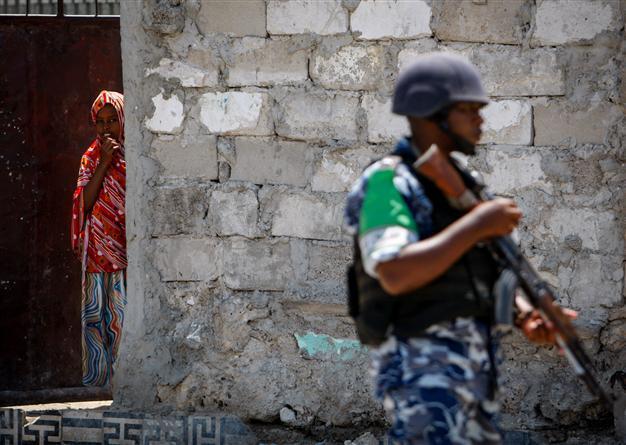Yemen, Iran-linked groups ‘send’ arms to Somalia
UNITED NATIONS – Reuters

n a handout photo taken by the African Union-United Nations Information Support Team on November 9, 2012 a young Somali woman looks on as a Ugandan police officer serving as part of a Formed Police Unit (FPU) with the African Union Union Mission in Somalia (AMISOM) walks past during a foot patrol in the Kaa'ran district in the Somali capital Mogadishu. AFP Photo
As the United States pushes for an end to the U.N. arms embargo on Somalia, U.N. monitors are reporting that Islamist militants in the Horn of Africa nation are receiving arms from distribution networks linked to Yemen and Iran, diplomats have said.
The U.N. Security Council’s sanctions monitoring team’s concerns about Iranian and Yemeni links to arms supplies for al-Shabaab militants come as Yemen is asking Tehran to stop backing armed groups on Yemeni soil. Last month Yemeni coast guards and the U.S. Navy seized a consignment of missiles and rockets the Sanaa government says were sent by Iran.
According to the latest findings by the monitoring group most, weapons deliveries are coming into northern Somalia after which they are moved farther south into al-Shabaab strongholds.
The supply chains in Yemen are largely Somali networks in that country, council diplomats said on condition of anonymity. Other weapons supplied included machine guns, said the group’s monthly report for January.
Yemen is proving to be of central importance for arming al-Shabaab, the monitors’ reporting shows, both because it is feeding arms into northern Somalia and because it has become a playing field for Iranian interests in Somalia and elsewhere. Iran’s U.N. mission did not respond immediately to a request for comment.
The monitors found Iranian and North Korean-manufactured weapons that came to Somalia via Libya at a base of the U.N.-backed African Union peacekeeping force in Somalia.
“Why are Iranian and North Korean small arms finding their way into Somalia from Libya? Do they date from before the arms embargoes (against both North Korea and Iran)? How did they get there from Libya?” a council diplomat asked.
U.N. Secretary-General Ban Ki-moon has said the 15-nation council should consider lifting the arms embargo to help rebuild Somalia’s security forces and consolidate military gains against the al-Qaeda-linked al-Shabaab militants. It is a position that has the strong backing of the United States.
Diplomats said Britain, France and Argentina are the council members most reluctant to end the arms embargo, preferring a gradual easing of it instead. The Somalia and Eritrea Monitoring Group has also opposed the idea of lifting it and see their latest findings as proof of why that would be unwise, diplomats said.
U.N. discussions on the Somalia arms embargo are expected to continue through March, when the Security Council must pass a resolution to renew the mandate of the African Union peacekeeping force.
